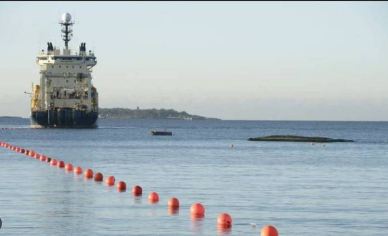Helsinki, Jan 14 (AFP/APP): NATO countries on the Baltic Sea will look to boost security when they meet in Helsinki on Tuesday, following the suspected sabotage of undersea cables widely blamed on Russia.
They are expected to announce a NATO patrol mission monitoring activity “below, above, and on the sea surface”, researcher Iro Sarkka of the Finnish Institute of International Affairs told AFP.
Several undersea telecom and power cables have been severed in the Baltic Sea in recent months, with experts and politicians accusing Russia of orchestrating a hybrid war.
The sabotage has been blamed on a “shadow fleet” of vessels — often ageing and operating under opaque ownership — that carry Russian crude oil and petroleum products, embargoed since the invasion of Ukraine.
Addressing the European Parliament, NATO Secretary General Mark Rutte stressed Monday the need to make clear that “such hostile actions” and such efforts “will not go unanswered”.
“We will also strengthen NATO’s military presence in the region, and of course, we will discuss the shadow fleet and what to do about it, so we are responding and will continue to ensure no country can exploit us, control our infrastructure or disrupt our societies,” Rutte said, adding he would be attending the meeting.
Tuesday’s meeting will focus on “strengthening of NATO’s presence in the Baltic Sea and responding to the threat posed by Russia’s shadow fleet”, according to a statement from the office of Finnish President Alexander Stubb, who is co-hosting the meeting with Estonian Prime Minister Kristen Michal.
Stubb also promised “measures required to secure the critical underwater infrastructure”.
The leaders of Denmark, Germany, Latvia, Lithuania, Poland and Sweden, and the executive vice-president of the European Commission Henna Virkkunen are expected to attend.
NATO said in late December it would increase its presence in the region following the suspected sabotage of undersea cables between Finland and Estonia, but it has yet to announce an official operation.
“How long the potential operation will last and what kind of mandate it will have I assume will be revealed (on Tuesday),” Sarkka said, adding that maritime operations have previously been conducted by NATO in the Mediterranean Sea.
“The actions in recent months related to the Russian shadow fleet and sabotage has prompted NATO to develop its maritime situational awareness in the Baltic Sea region,” she added.
A comprehensive NATO operation would serve as a “deterrent and a strategic signal” that NATO is prepared to act in response to the recent activities, according to Sarkka.

















